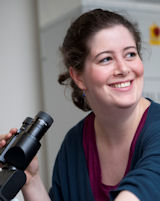You are here: Centre for Doctoral Training in Molecular-Scale Engineering > Our Students > Sybilla Corbett
Sybilla Corbett

Background
I graduated from the University of Leeds with an MNatSci and BSc (Ind) in Natural Sciences, majoring in Biochemistry and with a minor in Biology. During my undergraduate degree I undertook a year in Industry at Kew's Millennium Seed Bank. My third year project was on protein refolding, I then undertook a summer placement at Leeds University on enzyme kinetics. My Masters project focussed on cloning, protein production and protein crystallography.
My undergraduate degree was multidisciplinary and I enjoyed the way different subjects complemented each other. Molecular-scale engineering is a field that allows me to use knowledge I already have and requires me to supplement it with things I have never been taught. I'm always learning new things.
Sybilla talks about the projects she has undertaken so far.
Research Interests
In a broad sense, I like to understand how things work at quite a basic level; I'm not always motivated by direct applications but more about understanding a system. I believe that by following what is interesting and novel, applications will eventually become apparent. I'm interested in the interaction between soft and hard matter; the use of biological molecules in an engineering context and the use of physical techniques to investigate biological systems.
I hope to undertake interesting research and to find out new things. I hope that, eventually, my work will have some impact on the field. I have undertaken three preliminary projects in different areas, in an attempt to identify the area I would most like to work in. I spent my first rotation working on DNA patterning and using AFM to visualize DNA-protein complexes. For my second rotation I was attempting to carry out force measurements of cell adhesion by using an AFM to pull cells apart. My third rotation is investigating the interaction between magnetic nanoparticles and the proteins that make them.
The CDT Advantage
By encouraging a more interdisciplinary approach to science, I think the integrated PhD we are undertaking will open a broader range of opportunities to us. Fostering a basic understanding of various fields in the first year enables you to make a more educated decision about the PhD project we choose and to be a more effective researcher.
I think the thing I have most enjoyed about this year has been learning so many new things. I have become more familiar with concepts in physics and chemistry that have complemented my pre-existing knowledge. Being around other students who are learning biochemistry for the first time has given me the opportunity to engage in more informal discussions about the way science works. I can now approach my research with a broad range of techniques and ways of analysing that were not available to me previously.
I enjoy working at the border between different areas of science, requiring collaboration and the constant need to learn and update your knowledge. I hope my career in science will allow me to keep working in these interdisciplinary areas. Sometimes the pace of the course can be quite hectic; in the first few weeks you are constantly moving around, trying to get to know people and get on top of work. It wasn't too long before I was in the swing of things and enjoying myself. Molecular-scale engineering is great fun and an intellectual challenge that will stand you in good stead for a successful career in science.


